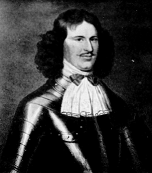Ancestry of Francis Galton
Galton came from famously good stock, sharing the distinguished grandparent Erasmus Darwin with Charles Darwin. This is shown in the interesting family tree constructed by Karl Pearson. Due to the efforts of the Galton laboratory, under Pearson's direction, a great deal is now known about the interconnecting Galton, Darwin, Barclay and Collier/Colyear families, which provided the pool from which Francis Galton was drawn.
The Galtons were well-known in Bristol and Birmingham, and had made a tidy fortune in iron mongering, gun manufacturing and banking. Ultimately the name can be traced back to the village of Galton in the county Dorset. Galtons had also practiced law in Bristol in the 17th century. Francis' great-great-grandfather John Galton (1671-1743) had joined the Quakers in the early 1700s, on his marriage into the Quaker Button family, and the Galtons were Quakers until Francis' father Samuel Tertius Galton (1783-1844) converted to the Church of England in 1807. John Galton had married into the Quaker Button family, his son Samuel (1720-99) married into the Quaker Farmer family, and his grandson Samuel John (1753-1832, Francis' grandfather) married into the Quaker Barclays (now famous for their banking connections). So paternally Francis was related to the Quaker stock in many lines, an inheritance which was reinforced by the Quaker tendency to intermarry: his grandmother Lucy Barclay was a Barclay by at least three lines.
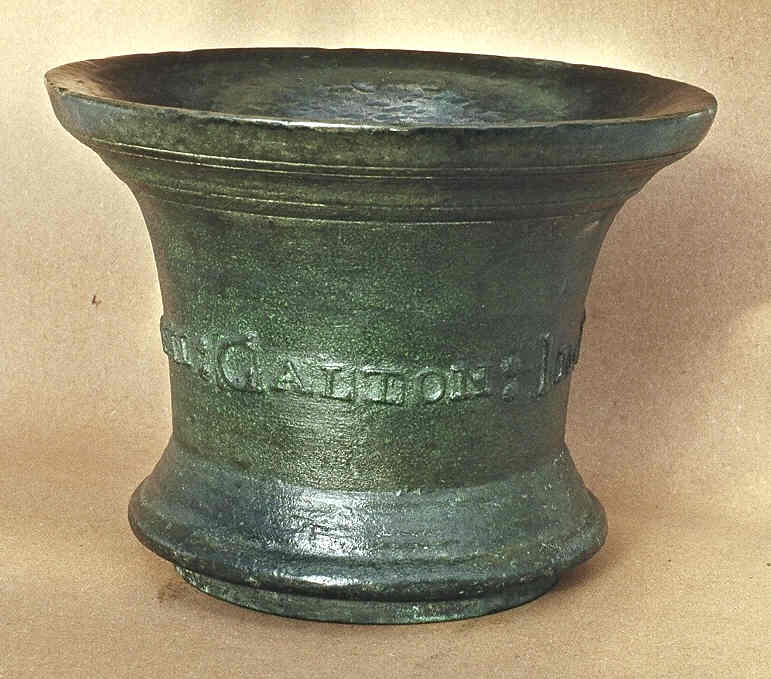
A large bronze mortar by John Galton, manufactured in
Taunton in 1705 (courtesy of David Pearsall)
The Barclays may well have been more important to Francis Galton's ancestry than even the Darwins. They included strongmen and athletes like Robert Barclay Allardyce ("Captain Barclay, the Pedestrian", noted for his athletic feats); Robert Barclay (1648-1690, "The Apologist" and early Quaker); and the colourful highland chieftain, Ewen Cameron of Lochiel (1629-1719). A notable feature of the immediate family of Francis Galton was the unusual longevity of its members, and it is most likely that this was inherited from the Barclay and Collier lines, along with a great deal of physical robustness and athletic ability.
Francis' grandfather Samuel "John" Galton was principally responsible for the family fortune. The Galton family were active in the ironmonger business in the Birmingham area in the early 1700s. Samuel Galton (the elder) had entered into the gun business, in partnership with the Farmer family, and had ultimately bought out the Farmers, who had nearly been ruined by the Lisbon earthquake of 1755. Although the gun business (which the Galtons had founded in partnership with the Farmers) was certainly thriving when Samuel's son, Samuel "John", was inducted into it upon coming of age in 1775, he grew the business many times over, from around 10,000 to around 140,000 pounds at the end of the 18th century. The business was ultimately dissolved by Samuel Tertius, a decade after the family had diversified into banking; but some time before then both Samuel Galtons had left the gun business altogether.
Fortunes of the Galton Family:
|
Year |
Firm |
Farmer |
Samuel Galton, Senior |
Samuel "John" Galton |
| 1747 | 10,000 | 7,500 | 2,500 | |
| 1766 | 36,143 | 13,862 | 22,281 | |
| 1775 | (dead) | 10,000 | ||
| 1778 | 91,404 | |||
| 1783 | 35,716 | |||
| 1788 | 43,049 | |||
| 1799 | (dead) | 139,007 | ||
| 1803 | 140,748 | |||
|
1832 |
300,000 |
(From Barbara D. Smith "The Galtons of Birmingham" Business History 1967: 132-150)
Aside from being a highly successful entrepreneur, Samuel "John" had scientific interests. He was a Fellow of the Royal Society and a member of the celebrated Birmingham "Lunar Society", whose members included Mathew Boulton, James Watt, Joseph Priestley, Erasmus Darwin, Josiah Wedgwood and Richard Lovell Edgeworth. The "Lunar Society" met for informal scientific discussions in Birmingham when it was safe to travel, on the nights of the full moon. Often the meeting place was at Great Barr, the summer residence of the Galtons, just outside Birmingham. Samuel "John" was a minor author in his own right, publishing a three volume book on The Natural Life of Birds, as well as technical papers such as "Experiments with Colours" (Monthly Magazine, 1799) and "On Canal Levels" (Annals of Philosophy IX, 1817). He dabbled continuously with scientific instruments and observations. In the 1790s Samuel "John" got involved into a heated dispute with the Quakers over the family gun business, when the Quakers decided that this was in conflict with their principles, and expelled him; undaunted, he published a spirited defense and continued to attend their meetings anyway.
The gun business was finally terminated by Samuel Tertius Galton, son of Samuel "John" and father of Francis, by around 1815. Samuel Tertius had attended and possibly matriculated at Cambridge (which was unusual for a Quaker). He joined his father in the gun trade, and later in a very successful banking venture founded in 1804. Apparently not as commercially motivated as his father, Samuel Tertius retired early on the proceeds of his father's substantial 300,000 pound estate. Francis attributed a "strong statistical bent" to his father, who had published a pamphlet on monetary economics, "A chart exhibiting the relation between the amount of Bank of England notes in circulation, the rate of foreign exchanges, and prices of Gold and silver bullion and of wheat".
Samuel Tertius had broken recent family tradition by marrying outside the Quakers, into the Darwin family. Violetta Darwin, Francis' mother, was a daughter of Erasmus Darwin by his second marriage. Erasmus was an illustrious figure in his day: establishing a highly successful medical practice; making numerous speculative forays into science, including Zoonomia; formulating an early theory of evolution based on acquired characteristics; setting scientific treatises in lengthy verse form with copious footnotes; and continuously dabbling in inventions and contrivances. Like Samuel John he was a regular member of the Lunar Society, which he founded, and a Fellow of the Royal Society. He had first married Mary Howard, one of the products of which was his son Robert Waring Darwin, father of Charles Darwin, the naturalist (Charles Darwin was therefore a half-cousin of Francis Galton). After the death of Mary Howard, Erasmus was remarried, to the widow Elizabeth Collier, whose ancestry can be traced back to the noted scholars of the Collier, Sedley and Savile families. Violetta Darwin was one of the products of this second marriage. In all, Erasmus had twelve children.
Cyril Burt once remarked of the Galton family that "an exceptional measure of intelligence is traceable in one or more members of every one of the ten generations for whom we have first hand information". Certainly Francis was drawn from a genetic pool containing an abundance of literary and scientific talent in multiple lines. Perhaps modern biographers should pay more attention to inheritance.
Consider literary talent: not enough justice is usually done to Galton's disarming skill as a scientific author, but a talent for writing was abundant, in sharply varying degrees, in the family. Beside his grandfather Samuel "John", whose book on birds was evidently well-received, his Aunt Schimmelpenninck published several notable memoirs and biographies, and remains known in her own right; his grandfather Erasmus Darwin, of course, produced voluminous verse; his mother wrote a book of Advice for Young Women upon their first going out into service; his father Samuel Tertius published a pamphlet on economics; his sister Emma wrote a successful Guide to the Unprotected, containing business advice for single women; and even his brother Erasmus published on agriculture, and mountaineering. More distantly, the Colliers, Sedleys, Saviles and Barclays abounded in literary ability of diverse kinds.
Ewen Cameron of Lochiel, last of the great highland chieftains,
progenitor of Francis Galton (through the Barclays).
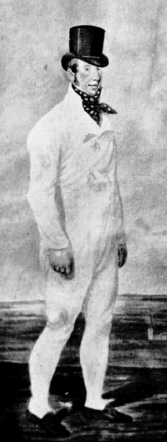
Captain Barclay the celebrated pedestrian and athlete, who walked a
thousand miles in a thousand hours for a famous wager. Brother of
grandmother Lucy Barclay, and hence great-uncle of Francis Galton.
When upwards of seventy years old he was dining at my
father's house in Leamington, and on being asked, while sitting at dessert,
whether he still performed any feats of strength, he asked my eldest
brother, then a fully adult man of more than 12 stone in weight, to step on
his hand, which he laid palm upwards on the floor by slightly bending his
body. My brother was desired to steady himself by laying one finger on
Captain Barclay's shoulder, who thereupon lifted and landed him on the
table. ... However, the Captain rather strained his shoulder by performing
it, as he confessed to my father afterwards.
-- Francis Galton,
Memories of My Life.
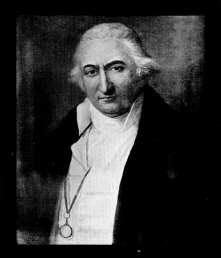
Samuel "John" Galton F.R.S., gun manufacturer and banker, paternal
grandfather of Francis Galton.
He had a decidedly statistical bent, loving to arrange all
kinds of data in parallel lines of corresponding lengths, and frequently
using colour for distinction. My father, and others of Samuel John Galton's
children, inherited this taste in a greater or less degree ...
-- Francis Galton,
Memories of My Life.
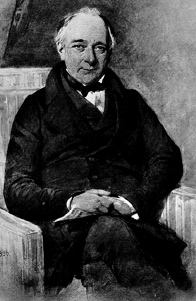
Samuel Tertius Galton, banker, father of Francis Galton.
"one of the most honourable and kindly of men, and eminently
statistical by disposition. He wrote a small book on currency, with tables,
which testifies to his taste. He had a scientific bent, having about his
house the simple gear appropriate to those days, of solar microscope,
orrery, telescopes, mountain barometers without which he never travelled,
and so forth. A sliding rule adapted to various uses was his constant
companion."
-- Francis Galton, Memories of My Life.
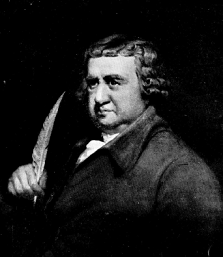
Erasmus Darwin
F.R.S.,
celebrated physician, scientist, and author, maternal grandfather of Francis
Galton
Gifted with a vivid imagination, uncommon power of
observation, an indefatigable love of research, original and prescient in
his views, he was among the first who occupied himself with the topics that
were subsequently explored by his grandson, Charles Darwin, to whom he
transmitted many of his characteristics.
-- Francis Galton, epitaph to Erasmus Darwin, Lichfield Cathedral.
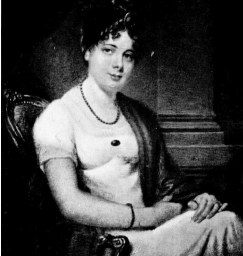
Violetta Darwin, daughter of Erasmus Darwin, mother of Francis Galton.
(*) Will any person, for a moment suppose, that as a Manufacturer, it is my object to encourage the Practice, or the Principle of War, or that I propose to myself any other end, than that which all commercial Persons propose, viz. the acquisition of Property?---And although it be true (and I lament the fact) that in too many Instances Fire Arms are employed in Offensive War, yet it ought in candor to be considered that they are equally applicable to the purposes of DEFENSIVE WAR, to the Support of the CIVIL POWER, to the PREVENTION OF WAR, and to the PRESERVATION OF PEACE.
(||)If Arguments from Abuse, are to be admitted against the Use, and the Existence of things, Objections may be made against almost every Institution, is susceptible of Abuse. Is the Farmer who sows Barley,---the Brewer who makes it into Beverage,---the Merchant who imports Rum, or the Distiller who makes Spirits;---are they responsible for the Intemperance, the Disease, the Vice, and Misery, which may ensue from their Abuse?---Upon this Principle, who would be innocent?
No reflecting Person will contend that the Manufacture of Fire Arms has ever been the Cause, or Occasion of any War; it is a consequence only, but not a Cause:---Neither can it be admitted that the Calamities of War have been increased thereby,---all History, both sacred and profane, prove the reverse---Those horrid Contests, since the invention of Fire Arms, are universally allowed to have been less sanguinary, and less ferocious.
